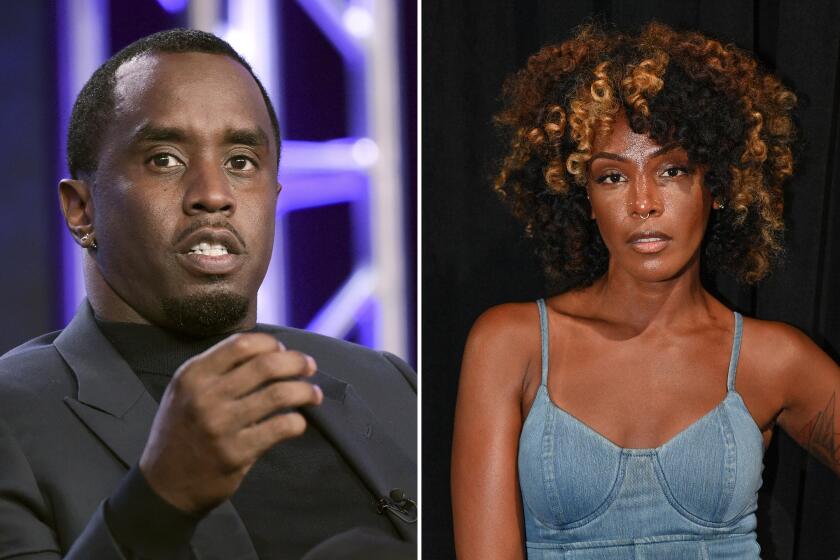Intel âCasts a Wider Net From Annual Music Festival
NEW YORK â Rock music makes people want to:
a) dance.
b) get hotter chips for their PCs.
Intel Corp., name sponsor of this yearâs Intel New York Music Festival, hopes the answer is both.
The giant chip maker is facilitating the live âNetcastingâ of concerts over the Internet--as in this yearâs four-day festival, which ended Saturday--and generally encouraging musicians to reach out to fans online.
Intel also backed the debut here last week of the first Web site at which digital music can be purchased and downloaded directly to a hard disk or recordable CD.
Like its 1980s predecessor, the New Music Seminar, the festival is a showcase for the up-and-coming and the obscure, as well as for celebrated alternative-music acts such as Better Than Ezra and Offspring.
But this year, Andrew Rasiej and Michael Dorf, New York nightclub owners and co-executive producers of the festival, threw down a technological gauntlet: They wouldnât accept mailed-in tapes or CDs from bands auditioning for a spot in the 340-band roster. All music samples had to be delivered by e-mail, and woe to the digitally challenged.
One next-to-unknown band that got aboard that way was the Baltimore-based, â60s throwback trio Splitsville, which played a frantic set Friday night at the East Village club Coney Island High. Singer-guitarist Matt âThe Messiahâ Huseman explained during a break after the performance that Splitsville came by their Internet savvy through a friend at the National Oceanic and Atmospheric Administration who has access to excellent federal-government computers.
âI need a Web site!â said Huseman, and his techno-wise pal complied (https://www.splitsville.com).
The Internet, said Huseman, is âevery egomaniacâs dream. You share the same space with major corporations.â
The way fans at home experience the festival, sponsored in previous years by Apple Computer Inc., has also evolved. Two years ago, the Internet festival site provided only still photos and text descriptions. Last year, audio from live performances was added. This time there was live audio and video from three of the 20 New York clubs involved, plus audio hookups from gigs in Los Angeles and six other U.S. cities and from six cities overseas.
âNetcasting is becoming a business, and concerts are the killer app,â Rasiej said last week in an interview at his Irving Plaza, a former vaudeville house that once featured stripper Gypsy Rose Lee.
Singer-songwriter Jill Sobule performed on opening night last Wednesday and kicked off the pre-festival hype a week earlier with a virtual performance in front of a computer and video camera.
âIt was very Jetson-like,â said Sobule, who communicates with fans by e-mail and pens an advice-to-the-lovelorn column at the Atlantic Records Web site (https://www.atlantic-records.com).
The demographic overlap between rock music fans and home computer users is so pronounced that Intel is spending a lot of time and energy to promote music online.
âForty percent of U.S. homes have PCs, but 60% of homes with kids have PCs,â said Intel Vice President Claude M. Leglise. âThe kids are the opinion leaders.â
Among the firms Intel has invested in are Santa Monica-based 2Way Media, publishers of Launch, the music-oriented CD-ROM and Internet magazine, and Res Rocket Surfer of London, makers of software enabling musicians in distant cities to perform live jam sessions with one another online.
Another Intel-backed company, Liquid Audio of Redwood City, Calif., made a splashy debut with its technology that allows music to be encoded and delivered electronically to the home PC. Liquid Audio joined with N2K, a record label that also runs the Music Boulevard Web service, to offer 15 downloadable songs for sale at 99 cents apiece--foreshadowing a day when the Internet becomes a competitor to the local music retailer.
Leglise said Intelâs main goal in the festival was to demonstrate to the artists how powerful a medium the computer can be for creating and connecting with listeners. A number of musicians have gotten the message and begun producing Internet-only material to test the waters.
More to Read
The biggest entertainment stories
Get our big stories about Hollywood, film, television, music, arts, culture and more right in your inbox as soon as they publish.
You may occasionally receive promotional content from the Los Angeles Times.








